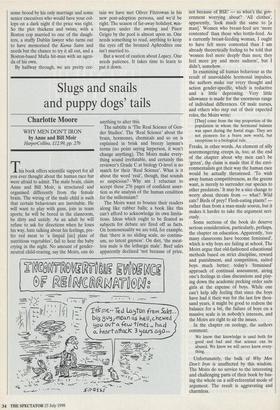Slugs and snails and puppy dogs' tails
Charlotte Moore
WHY MEN DON'T IRON by Anne and Bill Moir HarperCollins, £12.99, pp. 276 his book offers scientific support for all you ever thought about the human race but were afraid to admit. The male brain, claim Anne and Bill Moir, is structured and organised differently from the female brain. The wiring of the male child is such that certain behaviours are inevitable. He will want to play with guns, join in team sports; he will be bored in the classroom, be dirty and untidy. As an adult he will refuse to ask for directions when he loses his way, hate talking about his feelings, pre- fer red meat to 'a limpid [sic] plate of nutritious vegetables', fail to hear the baby crying in the night. No amount of gender- neutral child-rearing, say the Moirs, can do anything to alter this.
The subtitle is 'The Real Science of Gen- der Studies'. The 'Real Science' about the brain, hormones, chemicals and so on is explained in brisk and breezy layman's terms (no point saying layperson, it won't change anything). The Moirs make every- thing sound irrefutable, and certainly this reviewer's Grade C at biology 0-level is no match for their 'Real Science'. What is it about the word 'real', though, that sounds so suspicious?- Why am I reluctant to accept these 276 pages of confident asser- tion as the analysis of the human condition for the millennium?
The Moirs want to bounce their readers along like rubber balls; a book like this can't afford to acknowledge its own limita- tions. Ideas which ought to be floated as subjects for debate are fired off as facts. On homosexuality we are told, for example, that 'there is no sliding scale, no continu- um, no latent gayness'. On diet, 'the meat- less male is the lethargic male'. Beef sales apparently declined 'not because of price, not because of BSE' — so what's the gov- ernment worrying about? 'All clothes', apparently, 'look much the same to [a man]; Women who breast-feed are 'more contented' than those who bottle-feed. As a currently breast-feeding woman, I ought to have felt more contented than I am already theoretically feeling to be told that 'women feel more deeply than men; they feel more joy and more sadness', but I didn't, somehow.
In examining all human behaviour as the result of unavoidable hormonal impulses, the authors make our every thought and action gender-specific, which is reductive and a little depressing. Very little allowance is made for the enormous range of individual differences. Of male nurses, and others who step out of their expected roles, the Moirs write:
[They] come from the tiny proportion of the population in whom the hormonal balance was upset during the foetal stage. They are not pioneers for a brave new world, but exceptions to a biological rule.
Freaks, in other words. An element of silly scaremongering creeps in, too; at the end of the chapter about why men can't be 'green', the claim is made that if the envi- ronmentalists got their way the human race would be actually threatened. `To wish away human competitiveness, as the greens want, is merely to surrender our species to other predators.' It may be a nice change to worry about threats from — what? Wild cats? Birds of prey? Flesh-eating plants? — rather than from a man-made source, but it makes it harder to take the argument seri- ously.
Some sections of the book do deserve serious consideration, particularly, perhaps, the chapter on education. Apparently, 'too many classrooms have become feminised', which is why boys are failing at school. The Moirs argue that old-fashioned educational methods based on strict discipline, reward and punishment, and competition, suited boys much better; today's leminised' approach of continual assessment, airing one's feelings in class discussions and play- ing down the academic pecking order suits girls at the expense of boys. While one can't help idly feeling that since the boys have had it their way for the last few thou- sand years, it might be good to redress the balance for a bit, the failure of boys on a massive scale is in nobody's interests, and the Moirs are right to air the issues.
In the chapter on ecology, the authors comment: We know that knowledge is used both for good and bad and that science can be abused. We know we will never know every- thing.
Unfortunately, the bulk of Why Men Don't Iron is unaffected by this wisdom. The Moirs do no service to the interesting and challenging parts of their book by bas- ing the whole on a self-referential mode of argument. The result is aggravating and charmless.


























































 Previous page
Previous page